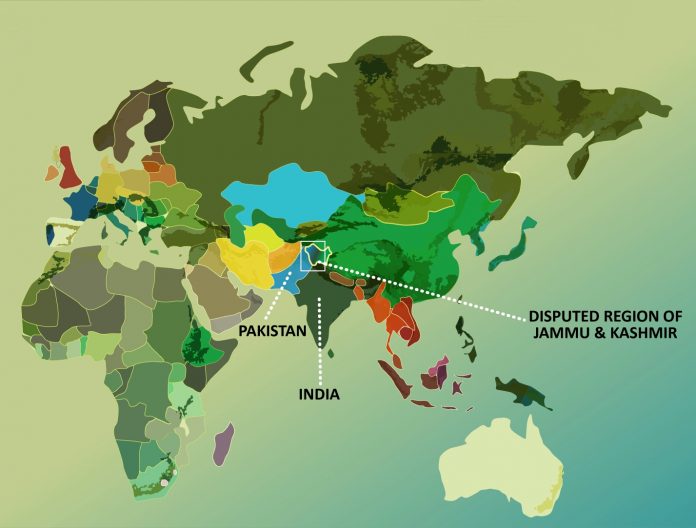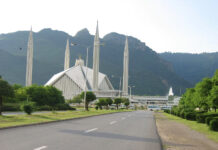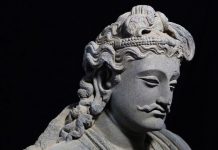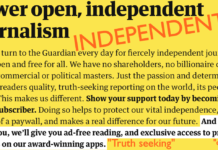“Pakistan and India are fighting over Kashmir, a third people’s land! One way to win this fight is by splitting the Kashmiris into different groups, ethnicities, religions, castes, social groups, languages. When people are divided, or adopt the identities of the Occupiers naively, the Occupiers always win. Indians and Pakistanis celebrate their own unity, cynically. But Jammu & Kashmir has to be forced into imaginary groups – we can’t be one nation, we have to be Azad Kashmir, Maqbuza Kashmir, Mirpur, Duggar; the Vale, Jammuwal, Hindu Pandit, Sikh, Muslim Kashmiri, Hindu Kashmiri, Sikh Kashmiri, Ethnic Kashmiri, Punjabi Caste Kashmiri, Real Kashmiri, Fake Kashmiri; Pir Panjaali, Ladakhi, Balawar, Dard, Hindu Brahman, Kashmiri Pandit, Dogra Brahman, Buddhist, Sikh, Mirpuri-Pahari, Pothwari, Pahari-Pothwari, Jat, Mughal, Rajput, Bhat, Bhatti, “high caste”, “low caste”, “Zamindar”, “Kammi”, “Ajlaaf”, Sunni, Shia, Ahmedi, Christian, Atheist, “occupation this, occupation that”, “Mir so and so”, “Khan so and so”, “traitor” so and so. They don’t want the natives. They want the land. They want the mountains, the water, the dams. They’re writing us out of our actual memories. They want to control our minds through identity labels that have no relevance to our suffering. They want us to be divided, never as sovereign people, but competing interest groups, manipulated to form non-existent groups. If ever deceit had a name, it would be called the Kashmir Conflict. The world has forgotten we’re human beings before anything else!”
Let’s get a couple of things clear from the outset.
We’re not speaking about how individuals view themselves, but about the underlying realities of identity labels that mean different things to different people, with differing levels of consciousness. You’re thinking, what the heck is this guy talking about?
Okay, just hear me out.
Just because you think you’re a “Pakistani”, a liberated (azad) “Kashmiri” or an occupied Indian, or vice versa, doesn’t mean others from these groups agree with you. There’s a reason why experts say identities are fluid, ambiguous and contested!
So let’s try to make sense of all this.
- In the case of the Pakistan ‘label’, we are speaking about nationality laws as set out and defined by the official institutions of a State with defined borders. This is akin to speaking of citizenship and reciprocating rights and duties between a State and its ‘nationals’. You can be born into your citizenship; or you can apply for citizenship (i.e, naturalisation); you can give it up, lose it or have it revoked.
- In the case of the ‘Kashmir’ label, we are speaking about ‘attitudes’ of ordinary “natives”, their lived experiences within a shared ethnic and territorial space and the ‘labels’ they use to express that vis-a-vis “foreigners”; we’re not necessarily speaking of nationality laws or political norms. Similarly, you can be born into your ‘ethnicity’ or ‘culture’, you can be assimilated into another people’s ‘ethnicity’ or ‘culture’. You can lose your identity (i.e., hide it, be ashamed of it, deny it) or reject it.
These two dynamics, the one ‘legal’ (political-cum-territorial) and the other ‘ethnonational’ produce different sets of priorities, and if you’re unfamiliar with the background you’d be left with the wrong impression when you encounter individuals saying that they’re one or the other, or both or neither. How people ‘identify‘ with something – a ‘cause‘, ‘group‘, ‘place‘, ‘territory‘ or ‘nation‘, and we can also mix these identities up, does not mean that the identification in question is unambiguous and beyond scrutiny.
Put simply, when you speak of your identity, you are saying, you identify with something – the net-result of the identification in question is anything but straightforward even though you think your version of your identity is cut and dry.
Still confused?
Think of this scenario; a Palestinian born in the territories of Israel to parents who were living in this ‘part of the world‘ when Israel came into existence. Let’s call this person Zainab. Zainab has ‘Israeli’ citizenship which shouldn’t be confused with the concept of nationality, the two overlap but are not the same thing. Nationality is not citizenship, just like ethnicity is not culture; cultural groups do not equate to ethnic identities. Zainab has an Israeli passport, but passports are not proof of bonafide citizenship, they exist for the purpose of travel, they are thus primarily travel documents for citizens travelling across national borders. Zainab speaks fluent Hebrew having progressed through the State’s educational system through Hebrew-medium education. She thinks in Hebrew, and is socialised according to the social norms of her society. She has Israeli friends of Jewish descent, and for all intents and purposes her appearance and behaviour, hobbies and interests, can’t be separated from other Israelis. From a cultural perspective, she does everything her Jewish Israeli peers do, and we would not be wrong to say that she actually shares an ‘ethnicity’ with her Israeli peers, Jewish or otherwise. Cultural anthropologists and sociologists would say she is thoroughly assimilated in the State’s ‘national’ culture – the culture of the Israeli mainstream.
Zainab is a Hebrew speaking Israeli.
But there’s one snag, Zainab is a person of conscience.
Moreover, Zainab is prepared to speak her mind.
She is not scared of popular bandwagons and fashionable causes within her group and from outside her group. Lot’s of people are scared to speak out against injustice except when it becomes popular and fashionable – this is the story of our modern world.
Zainab rejects her Israeli nationality on the basis that it is imposed, unjust and unfair. She believes that she is a ‘Palestinian’ and her homeland has been occupied by Israel. She vocally and critically self-affirms as a Palestinian. When the opportunity avails itself, she uses her Israeli passport to travel to the United Nations in America to protest the Israeli occupation of Palestine. As a fluent and articulate Hebrew speaker, Zainab speaks little to no Arabic given the circumstances of her upbringing, everyone around her speaks Hebrew, she gives her speech in Hebrew condemning the occupation of her people.
Thinking of Zainab as an Israeli or Palestinian is no longer straight forward. She has agency and she uses her agency to further the cause of a ‘two-state solution’, an independent and sovereign Palestine free from Israeli occupation, sea and land blockades, border checkpoints, barricades, and most importantly to her, ‘the very public ritual of her people’s humiliation daily’. She is simultaneously celebrated and demonised by her peers, and it’s no longer necessarily straight forward to put her in an identity ‘box’. She may even have Jewish supporters from Israel, who are themselves persons of conscience, whilst having detractors from Palestinians – because she doesn’t fit the stereotype of what a real Palestinian should be. She doesn’t wear a Hijab, or is ostensibly religious; she doesn’t equate Palestine with a fixed religious identity, but the suffering of ordinary people, Jewish, Christian, Muslim or Atheist.
So, you should understand that ‘identities’ have never been straightforward. They are fluid, complex and contested. They work for some people, but they don’t work for others. Identity labels mean different things to different people. Some individuals celebrate their identities because of ‘herd-mentality’ whilst others think about their identities through their own independent streak. They are not afraid to upset ‘interest groups’, offend or confront the unthinking ‘herd’. Identities change because people have the agency to change them. This has been happening throughout the ages. It happens everywhere, and not just in our part of the world.
You’ll hear people challenging the right of others to use labels that they think they own ‘exclusively’, and yet you’ve probably never thought twice about the group ‘label’ you use. You shouldn’t get distracted by the individual claims either, but rather turn your attention to the underlying priorities, and ask yourself, why would anyone care that another person is identifying with a group ‘label’ used by so many people that it is impossible for all of them to know what the others are thinking? If someone does not know everyone in his group, who gave him the right to be the group’s spokesperson? Worse, what right does he have to tell others of the imposters amongst them? This is one of more curious aspects of nation-state identities. The vast majority of people who feel strongly about their country’s identity will never meet every person in their group. Imagine, you probably don’t know more than 150 people from your country – a landmass, and yet you feel so connected to the “nation”, you’re prepared to fight for “nation and country!” There is an element of manipulation here that many of us are unfamiliar with; we often get manipulated to think that our national identity is somehow conterminous with us as individuals collectively.
It isn’t.
If you’re smart, mature and worldly, you’d have realised that the situation is a lot more complex than the simple ownership of ‘identity labels’, and there’s a lot more going on than just competition over ‘who owns what and belongs where’. Identities are not mere abstractions in our head, the sort of fuzzy emotions that keep us warm during a cold night, sitting in front of a fire. Identities have material consequences that are not necessarily fair or benign. They have ‘special interest groups’ who claim to speak for the ‘nation’ (everyone) when in fact they are only concerned about the priorities of their group and special interests. But, this can also lead to a reaction. Sometimes, this reaction can become visceral and hateful, conveniently leading opponents of a marginalised or dispossessed group to undermine a people’s actual grievances through personal attacks on individuals – character assassination. However, from the midst of the dispossessed can also come another generation, who challenge their continued forced identification with the ‘status quo’. Through knowledge, courage and conviction, they mobilise the downtrodden against inequality and injustice. In most instances, the status quo helps prop up privileged groups; it is a means of self-perpetuating an imbalance in society whilst protecting the vital interests of a tiny group who couldn’t care an iota for the welfare of the majority.
Challenging the status quo can oftentimes prove perilous in one’s lifetime. But for some people, even if they were to lose everything, get locked up in some dingy prison, they believe strongly that an ‘identity’ has been imposed upon them. They are railroading against unfair material circumstances, inequality and state-sanctioned discrimination. The imposed identity in this respect becomes a symbol of something rotten, horrible, cruel and ugly. Think of an African-‘American’ living in ‘Jim Crow’ America being told he must fight for his country in Vietnam, because this is how patriots of America prove themselves. And he retorts that he would first have to be treated like an equal for him to be willing to give up his life for his fellow Americans!
These are people of conscience.
Sadly, they are fast dwindling.
In the world of social media today, we’ve entire bandwagons of people joining the Black Lives Matter movement and tweeting the MeToo hashtag. It’s safe to join these socially enlightened movements, but in the 1960s, black people were being clubbed to death, whilst women exposing the crimes of their rapists were never believed.















